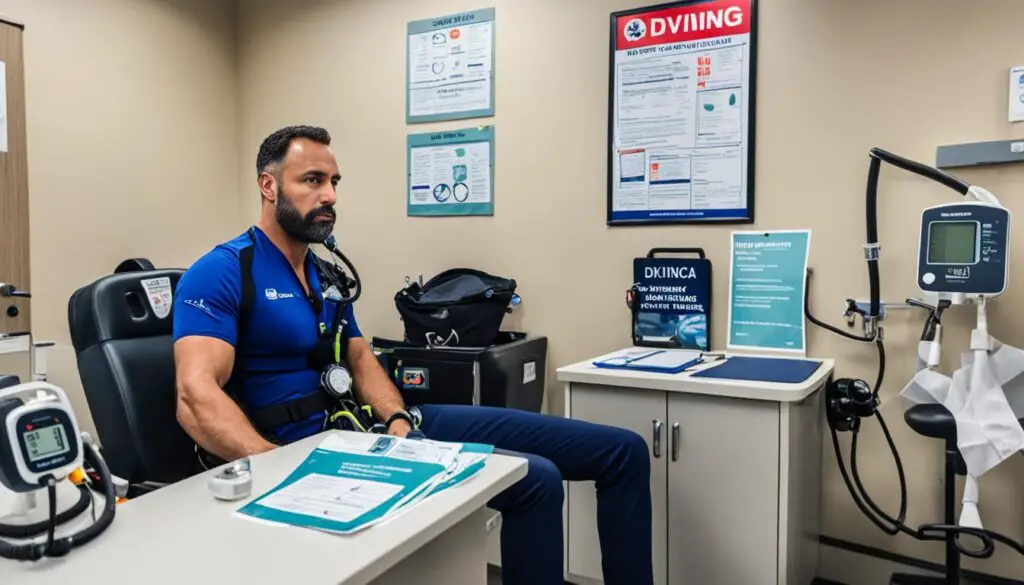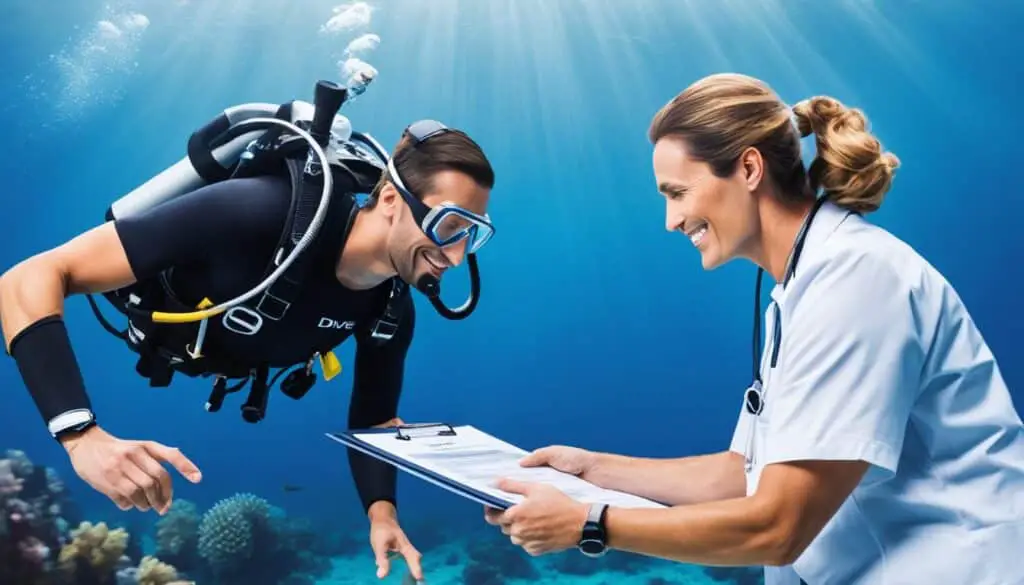When it comes to underwater adventures, nothing compares to the thrill and beauty of exploring the unknown depths. But before you embark on your next diving excursion, it’s crucial to prioritize your safety and well-being. That’s where diving medical checkups come in. By following these essential guidelines, you can ensure that you stay safe and dive with confidence.
Undergoing regular diving medical checkups is the key to assessing your fitness and suitability for diving activities. These checkups involve a comprehensive evaluation of your medical history, physical examination, and various tests to identify any potential risks or underlying conditions that may affect your safety while diving.
By investing in your health through these checkups, you can enjoy your diving experiences with peace of mind, knowing that you are physically capable and prepared.
Key Takeaways:
- Regular diving medical checkups are crucial for assessing your fitness for diving activities.
- These checkups involve a comprehensive evaluation of your medical history, physical examination, and tests.
- Investing in your health through diving medical checkups allows you to dive with confidence.
- Undergoing checkups helps identify any potential risks or underlying conditions that may affect your safety while diving.
- By prioritizing your health, you can enjoy your diving experiences with peace of mind.
Understanding the Importance of Diving Medical Checkups
Diving safety is of utmost importance for any diving enthusiast. One crucial aspect of ensuring diving safety is undergoing regular diving medical checkups. These checkups involve a comprehensive assessment of your health and fitness for diving. Let’s explore why these checkups are essential and what they entail.
The Importance of Health Assessment
- Diving safety: Diving poses unique challenges and potential risks, especially for individuals with underlying health conditions. A thorough health assessment can help identify any health issues that may affect your safety while diving.
- Medical history: Understanding your medical history is vital in determining potential risk factors or contraindications that may limit your ability to safely dive.
- Physical examination: A physical examination evaluates your overall physical fitness, with a focus on cardiovascular and respiratory health, which are crucial for safe diving.
- Specific tests: Additional tests may be conducted to assess factors such as lung function, fitness level, and any specific medical conditions that may require consideration during diving.
By undergoing these medical checkups, you can gain a comprehensive understanding of your current health status and make informed decisions about your diving activities.
Guidance from Diving Medicine Professionals
Consulting with a healthcare professional experienced in diving medicine is vital during the diving medical checkup process. These professionals possess specialized knowledge and expertise in evaluating diving-related health risks and can provide tailored advice based on your individual needs.
“It’s crucial to consult with a healthcare professional experienced in diving medicine to guide you through the process and provide expert advice tailored to your individual needs.” – Dr. Sarah Thompson, Diving Medicine Specialist
With their guidance, you can address any health concerns, receive recommendations for safe diving practices, and gain confidence in your ability to enjoy diving adventures while prioritizing your well-being.
Medical Evaluation for Diving Fitness
The medical evaluation for diving fitness is a crucial process that assesses your overall health and identifies any medical conditions or factors that may pose risks while diving. It is important to undergo this evaluation to ensure that you are physically capable of diving and to minimize the risks associated with underlying health conditions.
The evaluation begins with a review of your medical history, which helps identify any pre-existing conditions that may affect your diving safety. This includes information about past surgeries, chronic illnesses, and medications you may be taking. By understanding your medical history, healthcare professionals can identify potential contraindications for diving and tailor the evaluation accordingly.
Next, a physical examination is conducted to assess your cardiovascular and respiratory health. This involves evaluating your heart rate, blood pressure, lung function, and overall fitness level. These assessments are important to determine your ability to withstand the physical demands of diving and to ensure your safety in the water.
Specific Tests for Diving Evaluation
In addition to the medical history review and physical examination, specific tests are performed to assess your suitability for diving. These tests may vary depending on individual factors and may include:
- Lung function tests: These tests measure the capacity and efficiency of your lungs to ensure optimal respiratory function while diving.
- Exercise stress tests: These tests evaluate your cardiovascular fitness and your body’s ability to handle the physical stress of diving.
- Hearing and balance tests: These tests assess your ability to equalize pressure and maintain balance underwater, which is crucial for safe diving.
Throughout the evaluation process, healthcare professionals also consider contraindications for diving. Certain medical conditions, such as epilepsy, uncontrolled diabetes, and high-risk pregnancies, may pose significant risks while diving and may be contraindicated. Additionally, specific medications or medical procedures may also be contraindicated due to their effects underwater.
Better Safe Than Sorry
Undergoing a medical evaluation for diving fitness is not only essential for your safety but also for the safety of others diving with you. By ensuring that you are physically capable of diving and addressing any medical conditions or contraindications, you can minimize the risks associated with underwater activities and enjoy your diving experiences with confidence.

Common Medical Conditions and Diving Considerations
When it comes to diving, it’s important to be aware of common medical conditions that may require special considerations. These conditions, such as asthma, cardiovascular disease, and ear problems, can potentially affect your ability to equalize pressure underwater and increase the risk of complications during a dive. Additionally, certain medications may have adverse effects when diving.
For individuals with asthma, the increased pressure underwater can cause airway narrowing and make it difficult to breathe. It’s essential to have your condition well-controlled and discuss any concerns with your healthcare provider before diving.
Individuals with cardiovascular disease need to be cautious as the physical demands of diving can put strain on the heart. It’s important to have a thorough medical evaluation to ensure your heart is strong enough for diving activities.
Ear problems, such as a history of ear infections or perforated eardrums, can make equalizing pressure challenging and increase the risk of barotrauma. Prior to diving, it’s crucial to address any ear issues and have clearance from a healthcare professional.
Some medications, such as certain decongestants or sedatives, may impair judgment, affect your ability to equalize pressure, or cause other unwanted effects underwater. It’s crucial to discuss all medications you are taking during your diving medical checkup to determine if any adjustments or restrictions are necessary.
Remember, diving with underlying medical conditions or while taking certain medications can pose risks. It’s important to consult with your healthcare provider during your diving medical checkup to determine the best course of action and whether any additional precautions or restrictions are necessary to ensure your safety while diving.
| Medical Condition | Considerations for Diving |
|---|---|
| Asthma | Ensure well-controlled condition, discuss concerns with healthcare provider |
| Cardiovascular Disease | Undergo thorough medical evaluation, ensure heart is strong enough for diving |
| Ear Problems | Address issues, obtain clearance from a healthcare professional |
| Medication Effects | Discuss all medications during diving medical checkup, determine necessary adjustments or restrictions |
By understanding these common medical conditions and the specific considerations for diving, you can prioritize your health and ensure a safe and enjoyable diving experience. Always consult with your healthcare provider for personalized advice that takes into account your medical history, current health status, and individual needs.
Tips for a Healthy Diving Lifestyle
Maintaining a healthy diving lifestyle is vital for your safety and well-being during underwater adventures. Here are some essential tips to enhance your diving experience:
- Physical Fitness: Prioritize your physical fitness by engaging in regular exercise. A strong and healthy body will help you navigate through the water with ease and reduce the risk of fatigue or injuries.
- Hydration: Stay hydrated before and during dives. Proper hydration is crucial for optimal physical performance and can help prevent issues like dehydration and cramping.
- Equalization Techniques: Practice proper equalization techniques to protect your ears and sinuses from barotrauma. Learn and master techniques like the Valsalva maneuver to safely equalize pressure as you descend.
- Safety Protocols: Always adhere to safety protocols and guidelines. This includes thorough equipment checks, buddy system, dive planning, emergency procedures, and maintaining proper buoyancy control.
- Mental and Emotional Well-Being: Manage stress and anxiety to ensure a positive diving experience. Engaging in relaxation techniques, such as deep breathing exercises, can help you stay calm and focused underwater.
By adopting these healthy diving habits, you can enhance your overall diving experience and reduce the risk of diving-related complications. Remember, your well-being is the key to exploring the underwater world with confidence and joy.

Conclusion
Prioritizing your health and following diving medical checkup guidelines is crucial for staying safe and diving with confidence. Regular checkups are essential to assess your fitness for diving and identify any potential risks or underlying conditions. By undergoing these evaluations and addressing medical considerations, you can ensure your physical well-being before embarking on any underwater adventure.
In addition to checkups, adopting a healthy diving lifestyle and following safety protocols further enhance your overall diving experience. Maintaining physical fitness, staying hydrated, and practicing proper equalization techniques are key factors in reducing the risk of complications during dives. By taking care of your physical and mental well-being, you can fully enjoy the wonders of the underwater world with peace of mind.
Remember, diving is an exhilarating and rewarding activity, but safety should always be a top priority. So, follow these guidelines, get your regular checkups, and dive into the underwater world with confidence. Stay safe and have exciting, memorable diving adventures!
FAQ
Why are diving medical checkups essential?
Diving medical checkups are essential for ensuring your fitness for underwater adventures and staying safe while diving. These checkups assess your health and identify any potential risks or underlying conditions that may affect your safety.
What does a diving medical checkup involve?
A diving medical checkup involves a comprehensive evaluation of your medical history, physical examination, and various tests to assess your fitness for diving. It helps identify any medical conditions or factors that may pose risks while diving.
How can a medical evaluation for diving fitness minimize risks?
The medical evaluation for diving fitness assesses your overall health, including factors like cardiovascular and respiratory health. It helps identify any underlying health conditions or contraindications that may increase risks while diving.
What are some common medical conditions that require special considerations for diving?
Conditions such as asthma, cardiovascular disease, and ear problems may affect your ability to equalize pressure and increase the risk of complications during a dive. It’s important to discuss any medical conditions or medications with your healthcare provider during your diving medical checkup.
What tips can help maintain a healthy diving lifestyle?
To maintain a healthy diving lifestyle, it’s important to prioritize physical fitness through regular exercise, stay hydrated before and during dives, practice proper equalization techniques, and follow all safety protocols and guidelines. Managing stress and anxiety is also crucial for mental and emotional well-being.
